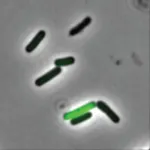(Press-News.org) Cold activates a cellular cleansing mechanism that breaks down harmful protein aggregations responsible for various diseases associated with aging. In recent years, studies on different model organisms have already shown that life expectancy increases significantly when body temperature is lowered. However, precisely how this works has still been unclear in many areas. A research team at the University of Cologne’s CECAD Cluster of Excellence in Aging Research has now unlocked one responsible mechanism. The study ‘Cold temperature extends longevity and prevents disease-related protein aggregation through PA28γ-induced proteasomes’ has appeared in Nature Aging.
Professor Dr David Vilchez and his working group used a non-vertebrate model organism, the nematode Caenorhabditis elegans, and cultivated human cells. Both carried the genes for two neurodegenerative diseases which typically occur in old age: amyotrophic lateral sclerosis (ALS) and Huntington’s disease. Both diseases are characterized by accumulations of harmful and damaging protein deposits – so-called pathological protein aggregations. In both model organisms, cold actively removed the protein clumps, thus preventing the protein aggregation that is pathological in both ALS and Huntington’s disease.
More precisely, the scientists explored the impact of cold on the activity of proteasomes, a cellular mechanism that removes damaged proteins from cells. The research revealed that the proteasome activator PA28γ/PSME3 mitigated the deficits caused by aging in both the nematode and in the human cells. In both cases, it was possible to activate proteasome activity through a moderate decrease in temperature. “Taken together, these results show how over the course of evolution, cold has preserved its influence on proteasome regulation – with therapeutic implications for aging and aging-associated diseases,” said Professor Vilchez.
Aging is a major risk factor for several neurodegenerative diseases associated with protein aggregation, including Alzheimer’s, Parkinson’s, Huntington’s and ALS. Vilchez added: “We believe that these results may be applied to other age-related neurodegenerative diseases as well as to other animal species.” A key finding was that the proteasome activity can also be increased by genetic overexpression of the activator. That way, disease-causing proteins can be eliminated even at the normal body temperature of 37 degrees Celsius. These results may provide therapeutic targets for aging and aging-associated diseases.
It has long been known that while extremely low temperatures can be harmful to organisms, a moderate reduction in body temperature can have very positive effects. For example, a lower body temperature prolongs the longevity of cold-blooded animals like worms, flies or fish, whose body temperature fluctuates with the temperature of the environment. However, the same phenomenon also applies to mammals, who maintain their body temperature within a narrow range no matter how cold or warm their environment is. For example, the nematode lives much longer if it is moved from the standard temperature of 20 degrees Celsius to a colder temperature of 15 degrees Celsius. And in mice, a slight decrease in body temperature of just 0.5 degrees significantly extends their lifespan. This supports the assumption that temperature reduction plays a central role in longevity in the animal kingdom and is a well-conserved evolutionary mechanism.
Even in humans, a correlation between body temperature and lifespan has been reported. Normal human body temperature is between 36.5 and 37 degrees Celsius. While an acute drop in body temperature below 35 degrees leads to hypothermia, human body temperature fluctuates slightly during the day and even reaches a cool 36 degrees during sleep. Interestingly, a previous study reported that human body temperature has steadily declined by 0.03 degrees Celsius per decade since the Industrial Revolution, suggesting a possible link to the progressive increase in human life expectancy over the last 160 years.
The research was conducted at the University of Cologne’s CECAD Cluster of Excellence in Aging Research.
END
Cold is beneficial for healthy aging
2023-04-03
ELSE PRESS RELEASES FROM THIS DATE:
Tiny eye movements are under a surprising degree of cognitive control
2023-04-03
A very subtle and seemingly random type of eye movement called ocular drift can be influenced by prior knowledge of the expected visual target, suggesting a surprising level of cognitive control over the eyes, according to a study led by Weill Cornell Medicine neuroscientists.
The discovery, described Apr. 3 in Current Biology, adds to the scientific understanding of how vision—far from being a mere absorption of incoming signals from the retina—is controlled and directed by cognitive processes.
“These ...
Griffin Charitable Foundation donates $71,000 to the Masonic Medical Research Institute
2023-04-03
UTICA, NY –A $71,000 donation by the Griffin Charitable Foundation, based in Rome, New York, was awarded to the Masonic Medical Research Institute (MMRI) to purchase a new state-of-the-art microscope for imaging cells. “It came as wonderful news that the Foundation pledged this generous donation,” said Stephen F. Izzo, MMRI’s Development Director. “This gift will make a profound impact on our research capabilities.”
The Griffin Charitable Foundation supports not-for-profit entities serving Rome and select organizations ...
Patients with schizophrenia have favorable surgical risk, opening the door for ethical consideration of neurosurgical interventions like Deep Brain Stimulation
2023-04-03
AURORA, Colo. (April 3, 2023) – A study published in Frontiers in Surgery finds that people with schizophrenia (SZ) and schizoaffective disorder (SAD) have overall lower surgical risk than people with Parkinson’s disease, which is reassuring when considering potential surgical interventions such as Deep Brain Stimulation (DBS) for the treatment of SZ and SAD.
DBS, a procedure that implants electrodes in the deeper structures of the brain connected to generators in the chest, is rare in treating SZ and ...
A 21st-century remedy for missed meds
2023-04-03
HOUSTON – (April 3, 2023) – Missing crucial doses of medicines and vaccines could become a thing of the past thanks to Rice University bioengineers’ next-level technology for making time-released drugs.
“This is a huge problem in the treatment of chronic disease,” said Kevin McHugh, corresponding author of a study about the technology published online in Advanced Materials. “It’s estimated that 50% of people don't take their medications correctly. With this, you’d give them one shot, and they’d be all set for the next couple of months.”
When patients fail to take prescription medicine or take it incorrectly, the costs can ...
Research suggests avenues toward gene therapies for polycystic kidney disease
2023-04-03
New Haven, Conn. — Autosomal dominant polycystic kidney disease (ADPKD) is the most common potentially lethal genetic disease—about a half million people in the United States alone suffer from the condition. There is no cure, but new research could open the door to new gene therapies for treating most cases of the disease.
For several decades, researchers have known that mutations in the PKD1 gene, which encodes the polycystin-1 (PC1) protein, can cause the disease in about 80% of cases. However, the protein is too big to be modified through gene therapy strategies. Now, a research ...
New research shows that bacteria get “hangry," too
2023-04-03
Have you ever been so hungry that you become angry, otherwise known as “hangry?” New research by Adam Rosenthal, PhD, assistant professor in the Department of Microbiology and Immunology, has found that some bacteria cells get hangry too, releasing harmful toxins into our bodies and making us sick.
Rosenthal and his colleagues from Harvard, Princeton and Danisco Animal Nutrition discovered, using a recently developed technology, that genetically identical cells within a bacterial community have different functions, with some members behaving more docile and others producing the very toxins that make us feel ill.
“Bacteria behave much more ...
Mount Sinai awarded prestigious $1.3 million grant to expand research training program in skin biology
2023-04-03
The Kimberly and Eric J. Waldman Department of Dermatology at the Icahn School of Medicine at Mount Sinai will expand its research training program in skin biology with support from a five-year, $1.3 million T32 grant from the National Institutes of Health (NIH) and the National Institute of Arthritis and Musculoskeletal and Skin Diseases (NIAMS).
The research training program in Systems Skin Biology will take a multidisciplinary approach in teaching scientists to holistically understand human physiology, health, and disease. As a recognized leader in research for skin biology and skin diseases, Mount Sinai will also become an incubator for future ...
MU grant will help ease nursing workforce shortage
2023-04-03
COLUMBIA, Mo. -- A recent grant from the Missouri Department of Economic Development will help train hundreds of MU students to become part-time nurse assistants at MU Health Care.
The three-year grant, which starts in fall 2023, will create a three-credit hour elective course within the MU Sinclair School of Nursing. The class will help nearly 100 MU students each year earn paid, part-time positions within MU Health Care as nurse assistants, also known as unlicensed assistive personnel (UAPs), certified nurse assistants (CNAs) and patient care technicians.
“We currently have nearly 800 pre-nursing undergraduate students at MU, and as a professor teaching a freshmen-level course, I ...
Yale-led team creates comprehensive resource for impact of genomic variants
2023-04-03
New Haven, Conn. — Each person has about 4 million sequence differences in their genome relative to the reference human genome. These differences are known as variants. A central goal in precision medicine is understanding which of these variants contribute to disease in a particular patient. Therefore, much of the human genome annotation effort is devoted to developing resources to help interpret the relative contribution of human variants to different observable phenotypes – i.e., determining variant impact.
Recently, Yale School of Medicine led a large NIH-sponsored study where multiple institutions and international collaborators came together ...
Illegal trade and poor regulation threaten pangolins in China
2023-04-03
Pangolins, unique scale-covered mammals, are drastically declining in numbers across Asia and Africa, largely due to illegal trade. Part of the trade, both legal and illegal, supports the traditional Chinese medicine market, which has attracted conservation attention. The level of demand for pangolins and other animals in traditional Chinese medicine, however, hasn’t been thoroughly studied.
In a new study published in the journal Nature Conservation, Dr Yifu Wang, currently a postdoc researcher at the University ...







